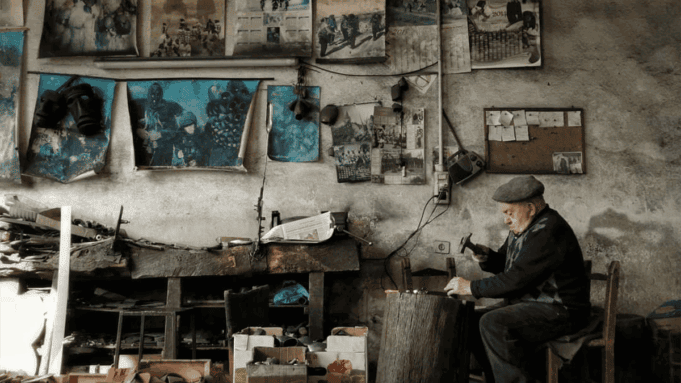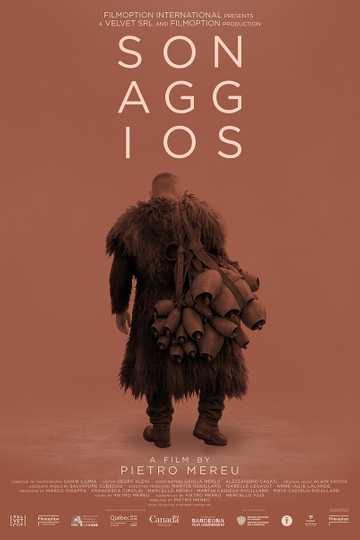I love this documentary, period. For those who would like to know a bit more, please read on.
This gem of a short film was featured in the 68th SF Film Festival, to the delight of all who saw it. Director Pietro Mereu and cinematographer Samir Ljuma focus on the town of Tonara near the center of Sardinia, a Mediterranean island off the coast of Italy. Tonara has history from the time of the Roman Empire, with well-preserved archaeological ruins.
This documentary introduces us to the world of artisans who make bells used by herdsmen throughout Italy—for cattle, oxen, goats, and sheep. These bells range in size from tiny to large, with correspondingly different sounds. Who makes these “cowbells” is at the heart of this documentary. The enchanting story is told through the voices of the skilled artisans as they work in their small foundries, casting metal and shaping bells by hand—the way they have done for centuries.
Tonara once had a dozen bell foundries; now it has two. How to preserve this ancient tradition with so much history and such cultural importance to the town? The skilled artisans of the Floris family and the Sulis family talk to each other as they search for a way to prevent their industry from disappearing.
Director Pietro knows this town well, and the families welcome his efforts to tell their story. Cameras roam discreetly through their foundries as they cut sheet metal, pack the bells into containers, and fire them in the coal-burning furnace. The work is hard and exacting. For example, where do they get the clay they need for this process? We see the men moving gingerly under the roots of a huge fallen tree, packing buckets with large clay pieces and hauling them to their trucks.
The Sulis family speculates that the hard labor aspect has discouraged many young men from pursuing the path taken by their fathers, grandfathers, and great-grandfathers. It takes years to perfect the skill needed to make quality bells.
Herdsmen are exacting in their requirements for bells. The sound needs to be recognizable so animals are not lost, and melodious to bring comfort to herders and livestock both. Aerial views show flocks of sheep and goats taking over small roads as they move about and around the towns. And there is the social aspect of this widely respected skill—festivals which draw locals and tourists.
The solution for saving this most unusual occupation? Develop a brand. After much discussion within the Sulis family, and to some extent with the Floris family, a branding consultant is called in. She does her homework to familiarize herself with this ancient occupation, and the process begins. Alongside hammers and clappers made of sheep bones, we see laptops, cell phones, and finally a laser for branding decorative cowbells to be sold for social and aesthetic purposes.
The solution for saving this most unusual occupation? Develop a brand.
A third family appears in the film. Sheep need to be sheared, and herdsmen take their flocks to the Locci sheepfold for this annual event. As the families watch over their sheep and then talk, irritation surfaces because they have to rely on Romanians working inside a large shed these days, and not on sheep shearers from their own towns. The all-day event used to be much more joyful when locals did the shearing outside in fresh air with friends and family. And they sang Sardinian songs as they worked. That was all in the past.
Each moment is more fascinating than the last—a classic mixture of old and new. Fresh olives heated next to the fireplace at home. Children come to the foundries to watch their fathers work, and play within the space. Compact cars and trucks parked in narrow streets, next to buildings that could be centuries old. Schoolteachers bring their classes to the foundries so kids may see and touch and learn. A men’s choir sings beautifully in Sardinian dialect.
And then there is preparation for the annual parade and enactment of the Mamuthones festival on St. Anthony’s feast day—with men wearing black masks and belts of good-sized cowbells in synchronized movements.
A deeply moving look at how people may work with their neighbors to preserve what is important in a culture, while accepting that some change is necessary in order to save their heritage.
This is the kind of unique and fascinating film one expects from the SF Film Festival, the oldest and longest-running film festival in North America. Over 11 days it presented 150 films from four dozen nations in San Francisco and Berkeley. The focus on young filmmakers in the SF Bay Area, on tributes and celebrations of legends, on documentaries and dramas continues to be impressive. Appreciation to Lucas Studios in the Presidio for office and media space.
Sonaggios is streaming on a number of platforms.





